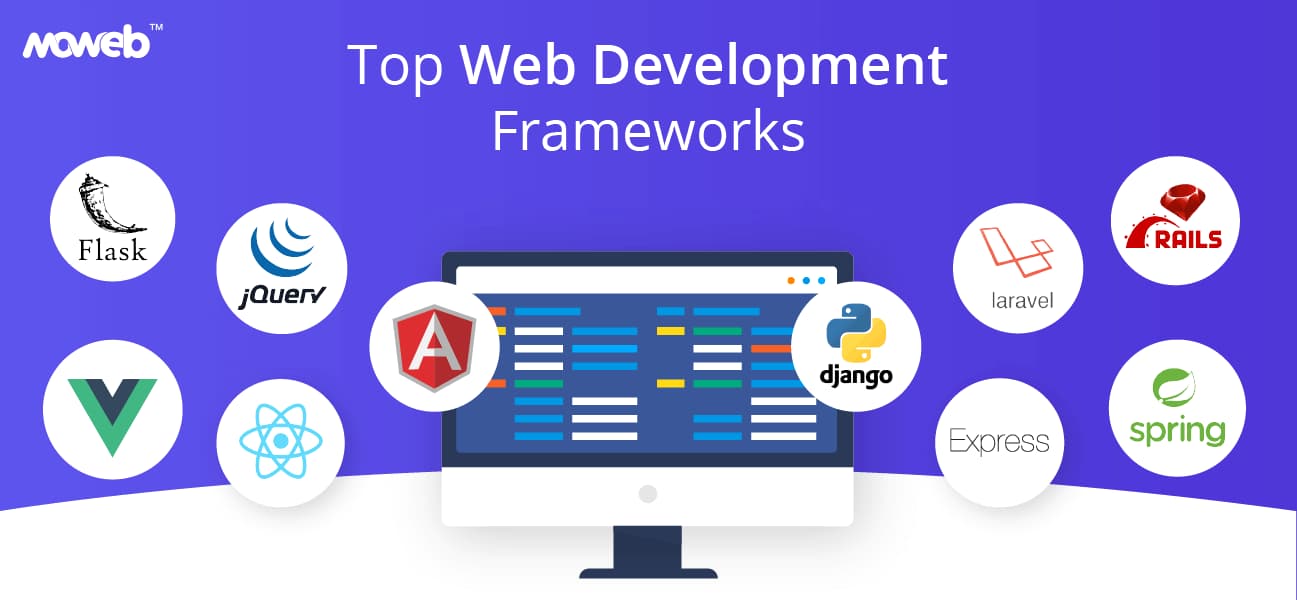Top 5 Frameworks for Web Development in 2024
Web development has evolved rapidly over the years, and choosing the right framework is crucial for building fast, secure, and scalable websites and applications. Whether you are a beginner or an experienced developer, selecting the right framework can enhance productivity, reduce development time, and improve performance.
In this article, we will explore the top 5 web development frameworks that stand out in 2024, covering their features, benefits, and use cases.
1. React.js – The Powerhouse for Frontend Development
What is React.js?
React.js is a popular JavaScript library developed by Facebook (Meta), designed for building interactive and dynamic user interfaces. It is widely used for single-page applications (SPAs) and is favored by developers for its component-based architecture and virtual DOM technology.
Key Features of React.js
✅ Component-Based Architecture – Reusable components simplify development and maintenance.
✅ Virtual DOM – Enhances performance by updating only the necessary parts of the UI.
✅ Strong Community Support – Large developer community and plenty of third-party libraries.
✅ SEO-Friendly – React can be optimized for SEO using server-side rendering (SSR) with frameworks like Next.js.
✅ Cross-Platform Support – React Native allows developers to build mobile apps using the same technology.
Best Use Cases for React.js
✔ Single Page Applications (SPAs) – Facebook, Instagram, Airbnb.
✔ Dashboards and Data-Driven Applications – Admin panels, analytics tools.
✔ E-commerce Websites – Amazon-like shopping platforms.
Why Choose React.js?
React.js is perfect for developers who want high performance, flexibility, and scalability. Its component-based approach allows for easy maintenance and rapid development.
2. Angular – The Complete Frontend Framework
What is Angular?
Angular, developed by Google, is a TypeScript-based framework known for building scalable web applications. It follows the MVC (Model-View-Controller) architecture and provides built-in features like dependency injection, two-way data binding, and directives.
Key Features of Angular
✅ Two-Way Data Binding – Syncs data between the model and the UI automatically.
✅ Dependency Injection (DI) – Enhances code efficiency and modularity.
✅ Comprehensive Ecosystem – Includes everything needed for large-scale applications.
✅ Security Features – Built-in protection against XSS and CSRF attacks.
✅ Server-Side Rendering (SSR) – Improves performance and SEO with Angular Universal.
Best Use Cases for Angular
✔ Enterprise-Level Web Applications – Banking, finance, healthcare portals.
✔ Progressive Web Apps (PWAs) – Offline-ready apps for better user experience.
✔ Real-Time Applications – Chat applications, messaging platforms.
Why Choose Angular?
Angular is ideal for large-scale, high-performance applications requiring structured architecture, robust security, and enterprise-level features.
3. Vue.js – The Progressive JavaScript Framework
What is Vue.js?
Vue.js is a lightweight JavaScript framework that is gaining popularity for its simplicity, flexibility, and ease of integration. It combines the best features of React and Angular while maintaining a gentle learning curve.
Key Features of Vue.js
✅ Simple & Lightweight – Easy to learn and implement.
✅ Virtual DOM – Enhances performance and speed.
✅ Two-Way Data Binding – Syncs the model and view efficiently.
✅ Component-Based Architecture – Encourages reusable UI elements.
✅ SSR & SEO-Friendly – Vue can be paired with Nuxt.js for server-side rendering.
Best Use Cases for Vue.js
✔ Small to Medium-Sized Projects – Personal websites, startups.
✔ Interactive Web Applications – SaaS platforms, dashboards.
✔ E-commerce Websites – Shopify-like stores with interactive UI.
Why Choose Vue.js?
Vue.js is perfect for developers who need a fast, simple, and flexible framework for building modern web applications. Its ease of integration makes it suitable for both new and existing projects.
4. Django – The Secure & Scalable Backend Framework
What is Django?
Django is a Python-based web framework known for its high security, scalability, and rapid development capabilities. It follows the DRY (Don’t Repeat Yourself) principle and is widely used in data-driven applications.
Key Features of Django
✅ Built-in Security – Protects against SQL injection, CSRF, and XSS attacks.
✅ Rapid Development – Includes an admin panel, authentication, and ORM.
✅ Scalability – Handles large amounts of data efficiently.
✅ REST API Support – Easily build APIs using Django REST Framework.
✅ SEO-Friendly – URL routing and meta-data management enhance SEO.
Best Use Cases for Django
✔ Data-Intensive Web Applications – Scientific research, finance, analytics.
✔ Content Management Systems (CMS) – News portals, blogs, corporate websites.
✔ Machine Learning & AI Applications – Integration with AI models for automation.
Why Choose Django?
Django is perfect for developers who prioritize security, scalability, and rapid development. Its batteries-included approach saves time by providing built-in features like authentication and ORM.
5. Laravel – The PHP Framework for Modern Web Apps
What is Laravel?
Laravel is a PHP framework that provides an elegant and expressive syntax for web development. It simplifies complex tasks like authentication, routing, and caching, making it a popular choice for backend development.
Key Features of Laravel
✅ Eloquent ORM – Simplifies database interactions.
✅ Blade Templating Engine – Enhances UI development.
✅ Built-in Authentication & Security – Protects against security threats.
✅ API Development Support – Creates RESTful APIs effortlessly.
✅ Task Scheduling – Automates routine tasks like sending emails.
Best Use Cases for Laravel
✔ Web Applications – SaaS platforms, enterprise solutions.
✔ E-commerce Platforms – Magento-like shopping websites.
✔ API Development – Backend for mobile and web applications.
Why Choose Laravel?
Laravel is developer-friendly, feature-rich, and secure, making it an excellent choice for scalable web applications.
Conclusion: Which Web Development Framework Should You Choose?
The best framework for your project depends on your specific requirements:
- For front-end development: React.js (best for SPAs), Angular (enterprise apps), Vue.js (lightweight and flexible).
- For backend development: Django (Python-based, secure), Laravel (PHP-based, powerful).
Each of these frameworks is powerful, reliable, and widely used in 2024. Whether you are building a small website, enterprise application, or an eCommerce store, selecting the right framework will set you up for success.
🚀 Start building today with the framework that best fits your needs!

